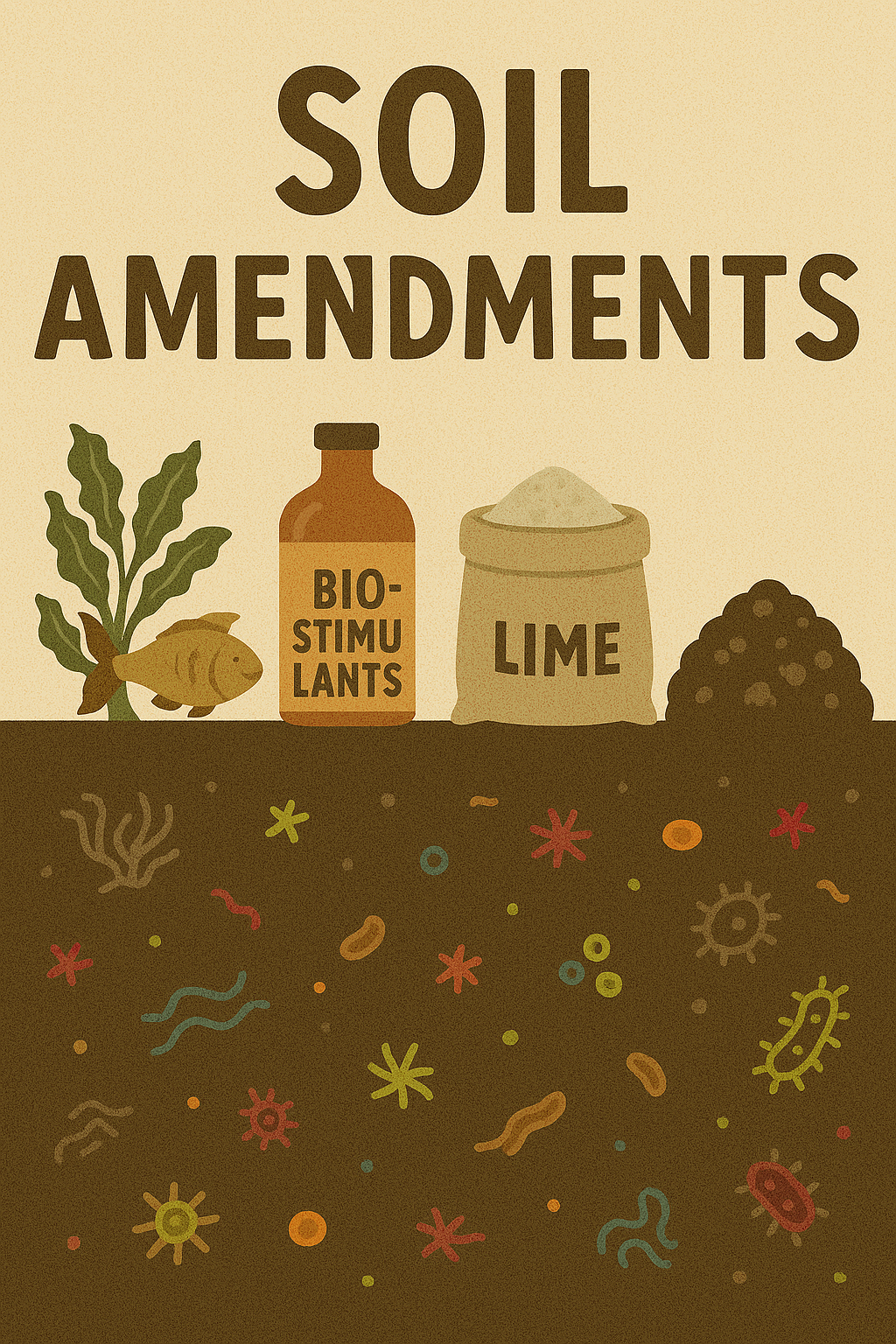
Soil Amendments
Soil health is the cornerstone of sustainable and productive farming. Soil amendments play a critical role in enhancing soil structure, fertility, and microbial activity, creating an environment where crops and pastures can thrive. These natural or synthetic inputs improve soil quality by addressing deficiencies, promoting beneficial biological activity, and supporting plant growth. Products like Respond biostimulant, Kofert seaweed, and Agrihub fish hydrolysate are excellent examples of soil amendments designed to meet the needs of modern, sustainable agriculture.
What Are Soil Amendments?
Soil amendments are substances added to the soil to improve its physical, chemical, or biological properties. Unlike fertilisers, which directly provide nutrients to plants, soil amendments primarily improve the soil’s capacity to support plant growth. They can:
- Enhance soil structure and porosity.
- Increase organic matter content.
- Stimulate beneficial microbial activity.
- Improve nutrient and water retention.
- Balance soil pH and nutrient availability.
Types of Soil Amendments and Their Functions
Organic Soil Amendments:
- These include materials derived from natural sources, such as compost, manure, fish hydrolysates, and seaweed products. Organic amendments provide nutrients in a slow-release form while building organic matter and promoting microbial diversity.
-
For example, Agrihub fish hydrolysate is an excellent organic amendment that delivers a balanced blend of nutrients while feeding soil microbes and improving soil structure.
Biostimulants:
- Biostimulants, such as Respond, work by enhancing plant growth and stimulating soil microbial activity. They are particularly effective in improving root development, boosting resilience to stress, and increasing nutrient availability by activating soil biology.
Mineral Amendments:
- These include lime, gypsum, and rock phosphate, which address soil pH, improve drainage, and supply essential minerals. Integrating these minerals with organic amendments can amplify their effectiveness.
Seaweed-Based Products:
- Seaweed fertilisers, like Kofert, are rich in trace elements, natural growth hormones, and organic compounds. They stimulate soil microbial activity, improve soil structure, and promote plant health.
How Soil Amendments Are Used
Soil amendments are versatile and can be applied in various ways depending on the farming system and specific goals:
Broadcast Application:
- Ideal for large-scale pastures and arable fields, where soil amendments like fish hydrolysate and seaweed fertilisers can be evenly distributed to improve overall soil health.
Targeted Application:
- For crops or specific areas with known deficiencies, biostimulants like Respond or organic materials can be applied directly to the root zone for maximum impact.
Foliar Application:
- Seaweed fertilisers and fish hydrolysates can also be used as foliar sprays to provide plants with a direct boost of nutrients and growth hormones.
Seed Coating:
- Products like Respond biostimulants and Kofert seaweed fertilisers can be applied directly to seeds as a coating. This ensures immediate availability of nutrients and biostimulants at germination, promoting stronger seedling establishment and early growth.
Integration with Existing Practices:
- Soil amendments can complement conventional farming systems. For instance, biostimulants and fish hydrolysates can reduce the need for synthetic nitrogen, and seaweed fertilisers can enhance the efficiency of other inputs.
By applying soil amendments in these ways, farmers can optimize their use for maximum benefit, ensuring healthier soils and more productive systems.
The Benefits of Soil Amendments
Improved Soil Structure:
- Organic amendments like fish hydrolysates increase soil porosity and water infiltration, making soils more resilient to compaction and erosion.
Enhanced Microbial Activity:
- Products like Respond biostimulants and Kofert seaweed fertilisers promote microbial diversity, which is critical for nutrient cycling and soil fertility.
Increased Nutrient Availability:
- Amendments improve the soil's ability to hold and release nutrients, ensuring plants have access to what they need for growth.
Sustainability and Resilience:
- By building organic matter and soil health, amendments create resilient systems that can better withstand droughts, floods, and other stressors.
Soil Amendments and Regenerative Agriculture
Soil amendments are central to regenerative agriculture, where the focus is on rebuilding soil health and enhancing ecosystem functions. Products like Respond biostimulants, Kofert seaweed fertilisers, and Agrihub fish hydrolysate align perfectly with these goals by:
- Supporting natural processes rather than replacing them with synthetic inputs.
- Encouraging biodiversity above and below the soil.
- Reducing reliance on chemical fertilizers while maintaining or even improving productivity.
Getting Started with Soil Amendments
Assess Soil Health:
- Conduct soil tests to identify deficiencies and determine which amendments will deliver the most benefit.
Choose the Right Products:
- Consider amendments like Agrihub fish hydrolysate for boosting organic matter, Respond biostimulants for activating soil biology, or Kofert seaweed fertilisers for micronutrient enhancement.
Integrate Gradually:
- Start with targeted applications and monitor the results before scaling up.
Complement Current Practices:
- Incorporate soil amendments alongside your existing fertiliser and spray programs for a balanced approach.
Conclusion
Soil amendments like Respond biostimulants, Kofert seaweed fertilisers, and Agrihub fish hydrolysate are invaluable tools for improving soil health and farm productivity. Whether you’re looking to increase microbial activity, enhance nutrient availability, or improve soil structure, these products provide effective and sustainable solutions. By integrating soil amendments into your farming system, you can unlock the full potential of your soil and build a healthier, more productive future.
